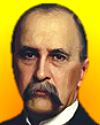 (source)
(source)
|
Sir William Osler
(12 Jul 1849 - 29 Dec 1919)
Canadian physician, medical educator and author whose clinical teaching, research and personality strongly influenced medical practice, including encouraging a warmer bedside manner between doctors and their patients. He wrote Principles and Practice of Medicine (1892), one of the most successful textbooks in medical history.
|
Science Quotes by Sir William Osler (47 quotes)
>> Click for Sir William Osler Quotes on | Experiment | Medicine | Nature |
>> Click for Sir William Osler Quotes on | Experiment | Medicine | Nature |
A desire to take medicine is, perhaps, the great feature which distinguishes man from other animals.
— Sir William Osler
'Recent Advances in Medicine', Science (1891), 17, 170.
A liberal education may be had at a very slight cost of time …[with] ten books which you may make close friends.
I. Old and New Testament.
II. Shakespeare.
III. Montaigne.
IV. Plutarch’s Lives.
V. Marcus Aurelius.
VI. Epictetus.
VII. Religio Medici.
VIII. Don Quixote.
IX. Emerson
X. Oliver Wendell Holmes—Breakfast-Table Series.
I. Old and New Testament.
II. Shakespeare.
III. Montaigne.
IV. Plutarch’s Lives.
V. Marcus Aurelius.
VI. Epictetus.
VII. Religio Medici.
VIII. Don Quixote.
IX. Emerson
X. Oliver Wendell Holmes—Breakfast-Table Series.
— Sir William Osler
From 'Bed-Side Reading List For Medical Students', final page of Aequanimitas and Other Addresses (1904, 1906), 475.
A library … is a great catalyser, accelerating the nutrition and rate of progress in a profession.
— Sir William Osler
Address for the Dedication of the New Building of the Boston Medical Library (12 Jan 1901). Printed as 'Books and Men', The Boston Medical and Surgical Journal (17 Jan 1901), 144, No. 3, 60.
A reference to the two sorts of doctors is also found in the Republic: “Now you know that when patients do not require medicine, but have only to be put under a regimen, the inferior sort of practitioner is deemed to be good enough; but when medicine has to be given, then the doctor should be more of a man.”
— Sir William Osler
Osler is referring to Plato’s Dialogues, iii, 153. In Address (1893) to the Johns Hopkins Hospital Historical Club, 'Physic and Physicians as Depicted in Plato', collected in Aequanimitas: With Other Addresses to Medical Students, Nurses and Practitioners of Medicine (1904), 70.
An old writer says that there are four sorts of readers: “Sponges which attract all without distinguishing; Howre-glasses which receive and powre out as fast; Bagges which only retain the dregges of the spices and let the wine escape, and Sives which retaine the best onely.” A man wastes a great many years before he reaches the ‘sive’ stage.
— Sir William Osler
Address for the Dedication of the New Building of the Boston Medical Library (12 Jan 1901). Printed as 'Books and Men', The Boston Medical and Surgical Journal (17 Jan 1901), 144, No. 3, 60. [Presumably “Howre-glasses” refers to Hour-glasses. -Webmaster]
At the outset do not be worried about this big question—Truth. It is a very simple matter if each one of you starts with the desire to get as much as possible. No human being is constituted to know the truth, the whole truth, and nothing but the truth; and even the best of men must be content with fragments, with partial glimpses, never the full fruition. In this unsatisfied quest the attitude of mind, the desire, the thirst—a thirst that from the soul must arise!—the fervent longing, are the be-all and the end-all.
— Sir William Osler
'The Student Life' (1905). In G. L. Keynes (ed.), Selected Writings of Sir William Osler (1951), 172.
Even in populous districts, the practice of medicine is a lonely road which winds up-hill all the way and a man may easily go astray and never reach the Delectable Mountains unless he early finds those shepherd guides of whom Bunyan tells, Knowledge, Experience, Watchful, and Sincere.
— Sir William Osler
In Aequanimitas (1904), 299.
Fed on the dry husks of facts, the human heart has a hidden want which science cannot supply.
— Sir William Osler
Science and Immorality (1904), 76.
Few men live lives of more devoted self-sacrifice than the family physician, but he may become so completely absorbed in work that leisure is unknown…. More than most men he feels the tragedy of isolation—that inner isolation so well expressed in Matthew Arnold’s line “We mortal millions live alone.”
— Sir William Osler
Address to the Canadian Medical Association, Montreal (17 Sep 1902), 'Chauvinism in Medicine', published in The Montreal Medical Journal (1902), 31, 267. Collected in Aequanimitas, with Other Addresses to Medical Students, Nurses and Practitioners of Medicine (1904), 299.
Happiness lies in the absorption in some vocation which satisfies the soul.
— Sir William Osler
From graduating address (4 Jun 1891) at Nurses Training School, Johns Hopkins Hospital, published as 'Doctor and Nurse', in Aequanimitas and Other Addresses (1904, 1906), 20.
Humanity has but three great enemies: fever, famine and war; of these by far the greatest, by far the most terrible, is fever.
— Sir William Osler
General Address on Medicine (6 May 1896), 'The Study of the Fevers of the South' In Harvey Cushing, The Life of Sir William Osler (1925), Vol. 1, 435. Cited as in Journal of the American Medical Association (1896), xxvi, 999-1004.
I have had three personal ideals. One, to do the day’s work well and not to bother about tomorrow.… The second ideal has been to act the Golden Rule, as far as in me lay, towards my professional brethren and towards the patients committed to my care. And the third has been to cultivate such a measure of equanimity as would enable me to bear success with humility, the affection of my friends without pride, and to be ready when the day of sorrow and grief came to meet it with the courage befitting a man.
— Sir William Osler
Remarks at farewell dinner given by the profession of the United States and Canada, New York (20 May 1905). Published as 'L’Envoi', No. 22 in Aequanimitas and other Addresses (1904, 1906), 473.
In departing from any settled opinion or belief, the variation, the change, the break with custom may come gradually; and the way is usually prepared; but the final break is made, as a rule, by some one individual, … who sees with his own eyes, and with an instinct or genius for truth, escapes from the routine in which his fellows live. But he often pays dearly for his boldness.
— Sir William Osler
In The Harveian Oration, delivered before the Royal College of Physicians of London (18 Oct 1906). Printed in 'The Growth of Truth, as Illustrated in the Discovery of the Circulation of Blood', The Lancet (27 Oct 1906), Vol. 2, Pt. 2, 1114.
In the fight which we have to wage incessantly against ignorance and quackery among the masses and follies of all sorts among the classes, diagnosis, not drugging, is our chief weapon of offence. Lack of systematic personal training in the methods of the recognition of disease leads to the misapplication of remedies, to long courses of treatment when treatment is useless, and so directly to that lack of confidence in our methods which is apt to place us in the eyes of the public on a level with empirics and quacks.
— Sir William Osler
Address to the Canadian Medical Association, Montreal (17 Sep 1902), 'Chauvinism in Medicine', published in The Montreal Medical Journal (1902), 31, 267. Collected in Aequanimitas, with Other Addresses to Medical Students, Nurses and Practitioners of Medicine (1904), 299.
In the Mortality Bills, pneumonia is an easy second, to tuberculosis; indeed in many cities the death-rate is now higher and it has become, to use the phrase of Bunyan 'the captain of the men of death.'
— Sir William Osler
'Medicine in the Nineteenth Century' (1904). In Aequanimitas with Other Addresses to Medical Students, Nurses and Practitioners of Medicine (1904), 260.
Like other departments of philosophy, medicine began with an age of wonder. The accidents of disease and the features of death aroused surprise and stimulated interest, and a beginning was made when man first asked in astonishment, Why should these things be?
— Sir William Osler
In 'The Evolution of Internal Medicine', Modern Medicine: Its Theory and Practice, (1907), Vol. 1, xvi.
Look wise, say nothing, and grunt. Speech was given to conceal thought.
— Sir William Osler
William Bennett Bean (ed.), Sir William Osler: Aphorisms from his Bedside Teachings and Writings, No. 267 (1950), 126.
Medicine is a science of uncertainty and an art of probability.
— Sir William Osler
William Bennett Bean (ed.), Sir William Osler: Aphorisms from his Bedside Teachings and Writings, No. 265 (1950), 125.
More than any other the practitioner of medicine may illustrate … that we are here not to get all we can out of life for ourselves, but to try to make the lives of others happier.
— Sir William Osler
From address 'The Master-Word in Medicine' written for a festival (Oct 1903) of inauguration of new laboratories at the University of Toronto. It was published as No. 18 in Aequanimitas and other Addresses (1904, 1906), 385.
My second fixed idea is the uselessness of men above sixty years of age, and the incalculable benefit it would be in commercial, political, and in professional life, if as a matter of course, men stopped work at this age.
— Sir William Osler
In farewell address, Johns Hopkins University, 'The Fixed Period', as quoted in Harvey Cushing, The Life of Sir William Osier (1925), vol. 1, 666. He was reflecting on his own intention to retire (now age 55) because he felt a teacher should have a fixed period of service. The title of his address was from an Anthony Trollope novel The Fixed Period which discussed the retiring of college teachers at age 60.
No special virtues are needed [other than those of an ordinary woman, are needed for a nurse], but the circumstances demand the exercise of them in a special way. There are seven, the mystic seven, your lamps to lighten at … tact, tidiness, taciturnity, sympathy, gentleness, cheerfulness, all linked together by charity.
— Sir William Osler
In Harvey Cushing, The Life of Sir William Osler (1929), Vol. 2, 361. From a letter replying when asked for his opinion whether “special virtues are needed for a nurse,” to which he referred in a commencement address (7 May 1913) to the Johns Hopkins nurses, Johns Hopkins Hospital Nurses' Alumnae Magazine, (Jul 1913), xii, 72-81, as cited in above book.
Nothing will sustain you more potently than the power to recognize in your humdrum routine, as perhaps it may be thought, the true poetry of life—the poetry of the commonplace, of the ordinary man, of the plain, toil-worn woman, with their loves and their joys, their sorrows and their griefs.
— Sir William Osler
From address 'The Student Life', No. 20 in Aequanimitas and other Addresses (1904, 1906), 423. This was a farewell address to American and Canadian medical students.
Now of the difficulties bound up with the public in which we doctors work, I hesitate to speak in a mixed audience. Common sense in matters medical is rare, and is usually in inverse ratio to the degree of education.
— Sir William Osler
'Teaching and Thinking' (1894). In Aequanimitas with Other Addresses to Medical Students, Nurses and Practitioners of Medicine (1904), 131.
Our bowels are outside of us—just a tucked-in portion.
— Sir William Osler
Bennett Bean (ed.), Sir William Osler: Aphorisms from his Bedside Teachings and Writings, No. 351 (1950), 145.
Search the scriptures of human achievement and you cannot find any to equal in beneficence the introduction of Anæsthesia, Sanitation, with ail that it includes, and Asepsis—a short half century’s contribution towards the practical solution of the problems of human suffering, regarded as eternal and insoluble.
— Sir William Osler
Address to the Canadian Medical association, Montreal (1902). Collected in 'Chavinism in Medicine', Aequanimitas (1904), 283.
Seeing and thinking have done much for human progress; in the sphere of mind and morals everything, and could the world have been saved by armchair philosophy, the Greeks would have done it; but only a novum organon could do this, the powerful possibilities of which were only revealed when man began to search our the secrets of nature by way of experiment, to use the words of Harvey.
— Sir William Osler
Address at the opening of the new Pathological Institute of the Royal Infirmary, Glasgow (4 Oct 1911). Printed in 'The Pathological Institute of a General Hospital', Glasgow Medical Journal (1911), 76, 326.
Tact is the saving virtue without which no woman can be a success in any way, as a nurse or not. She may have all the others, but without tact she is a failure.
— Sir William Osler
In Harvey Cushing, The Life of Sir William Osler (1929), Vol. 2, 361.
Take the sum of human achievement in action, in science, in art, in literature—subtract the work of the men above forty, and while we should miss great treasures, even priceless treasures, we would practically be where we are today. … The effective, moving, vitalizing work of the world is done between the ages of twenty-five and forty.
— Sir William Osler
In farewell address, Johns Hopkins University, 'The Fixed Period', as quoted in Harvey Cushing, The Life of Sir William Osier (1925), vol. 1, 666.
That man can interrogate as well as observe nature was a lesson slowly learned in his evolution. Of the two methods by which he can do this, the mathematical and the experimental, both have been equally fruitful—by the one he has gauged the starry heights and harnessed the cosmic forces to his will; by the other he has solved many of the problems of life and lightened many of the burdens of humanity.
— Sir William Osler
In 'The Evolution of the Idea of Experiment in Medicine', in C.G. Roland, Sir William Osler, 1849-1919: A Selection for Medical Students (1982), 103. As cited in William Osler and Mark E. Silverman (ed.), The Quotable Osler (2002), 249
The ancients thought as clearly as we do, had greater skills in the arts and in architecture, but they had never learned the use of the great instrument which has given man control over nature—experiment.
— Sir William Osler
Address at the opening of the new Pathological Institute of the Royal Infirmary, Glasgow (4 Oct 1911). Printed in 'The Pathological Institute of a General Hospital', Glasgow Medical Journal (1911), 76, 327.
The extraordinary development of modern science may be her undoing. Specialism, now a necessity, has fragmented the specialities themselves in a way that makes the outlook hazardous. The workers lose all sense of proportion in a maze of minutiae.
— Sir William Osler
'The Old Humanities and the New Science' (1919). In G. L. Keynes (ed.), Selected Writings of Sir William Osler (1951), 27.
The future belongs to Science. More and more she will control the destinies of the nations. Already she has them in her crucible and on her balances.
— Sir William Osler
In René Vallery-Radot, The Life of Pasteur (1919), xvi.
The greater the ignorance the greater the dogmatism.
— Sir William Osler
In Montréal Médical Journal (1902). Collected in Aequanimitas, with Other Addresses to Medical Students, Nurses and Practitioners of Medicine (1904), 279. Osler was referring to the ignorant dogmatism in literature from pharmaceutical houses and the hucksterism of some of their representatives.
The natural man has only two primal passions, to get and to beget.
— Sir William Osler
The Ingersoll Lecture, published as Science and Immortality (1904, 1906), 20.
The philosophies of one age have become the absurdities of the next, and the foolishness of yesterday has become the wisdom of tomorrow.
— Sir William Osler
Address to the Canadian Medical Association, Montreal (17 Sep 1902), 'Chauvinism in Medicine', published in The Montreal Medical Journal (1902), 31, 267. Collected in Aequanimitas, with Other Addresses to Medical Students, Nurses and Practitioners of Medicine (1904), 281.
The young doctor should look about early for an avocation, a pastime, that will take him away from patients, pills and potions. … No man is really happy or safe without one, and it makes precious little difference what the outside interest may be—botany, beetles or butterflies, roses, tulips or irises, fishing, mountaineering or antiquities—anything will do so long as he straddles a hobby and rides it hard.
— Sir William Osler
In 'The Medical Library in Post-Graduate Work', British Medical Journal (1909), 2, 927.

Candidate for medical degree being examined in the subject of “Bedside Manner” — Punch (22 Apr 1914) (source)
There are only two sorts of doctors: those who practice with their brains, and those who practice with their tongues.
— Sir William Osler
Address to McGill Medical School (1 Oct 1894), 'Teaching and Thinking', collected in Aequanimitas: With Other Addresses to Medical Students, Nurses and Practitioners of Medicine (1904), 131.
There is no more potent antidote to the corroding influence of mammon than the presence in the community of a body of men devoted to science, living for investigation and caring nothing for the lust of the eyes and the pride of life.
— Sir William Osler
In address at the University of Minnesota, "Teacher and Student" (1892) collected in Aequanimitas: With Other Addresses to Medical Students, Nurses and Practitioners of Medicine (1904), 29.
Things cannot always go your way. Learn to accept in silence the minor aggravations, cultivate the gift of taciturnity and consume your own smoke with an extra draught of hard work, so that those about you may not be annoyed with the dust and soot of your complaints.
— Sir William Osler
In Harvey Cushing, The Life of Sir William Osler (1926), Vol. 1, 619. 'The Master-Word in Medicine' was written for a festival (1903) for inauguration of new laboratories at the University of Toronto. It was published as No. 18 in Aequanimitas and other Addresses (1904, 1906), 385.
Though a little one, the master-word looms large in meaning. It is the open sesame to every portal, the great equalizer in the world, the true philosopher’s stone which transmutes all the base metal of humanity into gold. … The master-word is Work.
— Sir William Osler
In Harvey Cushing, The Life of Sir William Osler (1926), Vol. 1, 617. 'The Master-Word in Medicine' was written for a festival (1903) for inauguration of new laboratories at the University of Toronto. It was published as No. 18 in Aequanimitas and other Addresses (1904, 1906), 373-374.
To each of us life is an experiment in Nature’s laboratory, and she tests and tries us in a thousand ways, using us and improving us if we serve her turn, ruthlessly dispensing with us if we do not.
— Sir William Osler
In 'The Evolution of the Idea of Experiment in Medicine', Transactions of the Congress of American Physicians and Surgeons. Seventh Triennial Session (1907), 7.
To study the phenomenon of disease without books is to sail uncharted sea, while to study books without patients is not to go to sea at all.
— Sir William Osler
Address for the Dedication of the New Building of the Boston Medical Library (12 Jan 1901). Printed as 'Books and Men', The Boston Medical and Surgical Journal (17 Jan 1901), 144, No. 3, 60.
Varicose veins are the result of an improper selection of grandparents.
Indicating that varicose veins are hereditary.
Indicating that varicose veins are hereditary.
— Sir William Osler
In W. B. Bean, Sir William Osler: Aphorisms, 146. In Mark E. Silverman et al. (eds.), The Quotable Osler (2003), 127.
We are all dietetic sinners; only a small percent of what we eat nourishes us, the balance goes to waste and loss of energy .
— Sir William Osler
William Bennett Bean (ed.), Sir William Osler: Aphorisms from his Bedside Teachings and Writings, No. 191 (1950), 96.
We are here to add what we can to, not to get what we can from, Life.
— Sir William Osler
In Harvey Cushing, The Life of Sir William Osler (1925), Vol. 1, 352. From graduating address (4 Jun 1891) at Nurses Training School, Johns Hopkins Hospital, given in full as 'Doctor and Nurse', in Aequanimitas and Other Addresses (1904, 1906), 20.
While medicine is to be your vocation, or calling, see to it that you have also an avocation—some intellectual pastime which may serve to keep you in touch with the world of art, of science, or of letters. Begin at once the cultivation of some interest other than the purely professional. … No matter what it is—but have an outside hobby.
— Sir William Osler
From address at McGill College, Montreal (1899), 'After Twenty-Five Years', No. 11 in Aequanimitas and other Addresses (1904, 1906), 213.
Who runs may read the scroll which reason has placed as a warning over the human menageries: “chained, not tamed.” And yet who can doubt that the leaven of science, working in the individual, leavens in some slight degree the whole social fabric. Reason is at least free, or nearly so; the shackles of dogma have been removed, and faith herself, freed from a morganatic alliance, finds in the release great gain.
— Sir William Osler
Address to the Wistar Institute of Anatomy and Biology of the University of Pennsylvania (1894). Collected in 'The Leaven of Science', Aequanimitas (1904), 100. A “morganatic” alliance is one between persons of unequal rank, the noble and the common.
Quotes by others about Sir William Osler (1)
That ability to impart knowledge … what does it consist of? … a deep belief in the interest and importance of the thing taught, a concern about it amounting to a sort of passion. A man who knows a subject thoroughly, a man so soaked in it that he eats it, sleeps it and dreams it—this man can always teach it with success, no matter how little he knows of technical pedagogy. That is because there is enthusiasm in him, and because enthusiasm is almost as contagious as fear or the barber’s itch. An enthusiast is willing to go to any trouble to impart the glad news bubbling within him. He thinks that it is important and valuable for to know; given the slightest glow of interest in a pupil to start with, he will fan that glow to a flame. No hollow formalism cripples him and slows him down. He drags his best pupils along as fast as they can go, and he is so full of the thing that he never tires of expounding its elements to the dullest.
This passion, so unordered and yet so potent, explains the capacity for teaching that one frequently observes in scientific men of high attainments in their specialties—for example, Huxley, Ostwald, Karl Ludwig, Virchow, Billroth, Jowett, William G. Sumner, Halsted and Osler—men who knew nothing whatever about the so-called science of pedagogy, and would have derided its alleged principles if they had heard them stated.
This passion, so unordered and yet so potent, explains the capacity for teaching that one frequently observes in scientific men of high attainments in their specialties—for example, Huxley, Ostwald, Karl Ludwig, Virchow, Billroth, Jowett, William G. Sumner, Halsted and Osler—men who knew nothing whatever about the so-called science of pedagogy, and would have derided its alleged principles if they had heard them stated.
In Prejudices: third series (1922), 241-2.
For a longer excerpt, see H.L. Mencken on Teaching, Enthusiasm and Pedagogy.
For a longer excerpt, see H.L. Mencken on Teaching, Enthusiasm and Pedagogy.
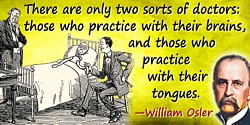
Candidate for medical degree being examined in the subject of “Bedside Manner” — Punch (22 Apr 1914) (source)
See also:
- 12 Jul - short biography, births, deaths and events on date of Osler's birth.
- Sir William Osler - Excerpt from 'Books And Men' address (12 Jan 1901)
- William Osler - context of quote “Two sorts of doctors” - Medium image (500 x 250 px)
- William Osler - context of quote “Two sorts of doctors” - Large image (800 x 400 px)
- William Osler: A Life in Medicine, by Michael Bliss. - book suggestion.
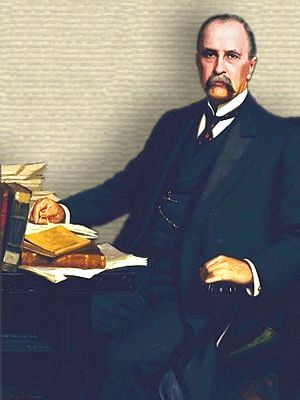


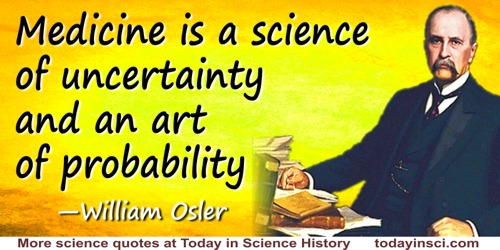




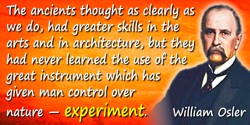
 In science it often happens that scientists say, 'You know that's a really good argument; my position is mistaken,' and then they would actually change their minds and you never hear that old view from them again. They really do it. It doesn't happen as often as it should, because scientists are human and change is sometimes painful. But it happens every day. I cannot recall the last time something like that happened in politics or religion.
(1987) --
In science it often happens that scientists say, 'You know that's a really good argument; my position is mistaken,' and then they would actually change their minds and you never hear that old view from them again. They really do it. It doesn't happen as often as it should, because scientists are human and change is sometimes painful. But it happens every day. I cannot recall the last time something like that happened in politics or religion.
(1987) -- 


